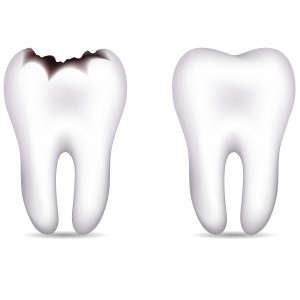 Just one lost tooth is all it takes to compromise everyday habits like eating and speaking. If you are missing a tooth, it can force you to adjust how you chew your food. It may also cause you to be self-conscious and try to avoid exposing the absence when you speak or smile. An absence can also have negative affects on your jawbone, and robs neighboring teeth of support. Prosthetic dentistry offers several ways for your dentist to restore your complete smile. A dental bridge can close a gap in your teeth. To remedy the loss of the tooth root, you can receive a dental implant to support your prosthetic. (more…)
Just one lost tooth is all it takes to compromise everyday habits like eating and speaking. If you are missing a tooth, it can force you to adjust how you chew your food. It may also cause you to be self-conscious and try to avoid exposing the absence when you speak or smile. An absence can also have negative affects on your jawbone, and robs neighboring teeth of support. Prosthetic dentistry offers several ways for your dentist to restore your complete smile. A dental bridge can close a gap in your teeth. To remedy the loss of the tooth root, you can receive a dental implant to support your prosthetic. (more…)
Working With Your Dentist To Address TMJ Dysfunction
 TMJ refers to the temporomandibular joint, the joints that connect your jawbone to the rest of your skull. Problems with your TMJs can result in a number of uncomfortable symptoms. TMJ dysfunction can cause headaches, make it difficult to move your jaw to speak or eat, and can even cause your jaw to feel “stuck,” and become difficult to move. Your dentist can work with you to identify potential causes of TMJ dysfunction, and help you address its related aches and pains. (more…)
TMJ refers to the temporomandibular joint, the joints that connect your jawbone to the rest of your skull. Problems with your TMJs can result in a number of uncomfortable symptoms. TMJ dysfunction can cause headaches, make it difficult to move your jaw to speak or eat, and can even cause your jaw to feel “stuck,” and become difficult to move. Your dentist can work with you to identify potential causes of TMJ dysfunction, and help you address its related aches and pains. (more…)
Crooked Teeth And Cavities
 Crooked teeth can adversely affect the appearance of your smile, but their effect is not just cosmetic. They can leave certain parts of your teeth less accessible when you brush, which makes those hard-to-reach areas more susceptible to developing cavities. If your teeth are misaligned, but you are apprehensive about receiving braces, you could benefit from Invisalign aligners. Invisalign can straighten teeth without visually obtrusive bracket-and-wire braces. In addition to improving your appearance, aligners can eliminate the awkward overlaps between teeth that face an increased risk for cavities. (more…)
Crooked teeth can adversely affect the appearance of your smile, but their effect is not just cosmetic. They can leave certain parts of your teeth less accessible when you brush, which makes those hard-to-reach areas more susceptible to developing cavities. If your teeth are misaligned, but you are apprehensive about receiving braces, you could benefit from Invisalign aligners. Invisalign can straighten teeth without visually obtrusive bracket-and-wire braces. In addition to improving your appearance, aligners can eliminate the awkward overlaps between teeth that face an increased risk for cavities. (more…)
Responding To Different Types Of Tooth Discoloration
 Whitening treatments are intended to treat stains that have discolored your enamel. Over-the-counter treatments address surface stains, while the whitening treatments from your dentist can treat stains that are deeper-set in your enamel. But what about discoloration that comes from something other than enamel stains? Standard whitening may be less well-suited to treat discoloration that comes from physical trauma, or from taking certain medications. Your dentist can help you determine if traditional whitening methods are right for you. If you are not an ideal candidate for this treatment, other cosmetic treatments are available to help you attain the smile you want to show the world.
Whitening treatments are intended to treat stains that have discolored your enamel. Over-the-counter treatments address surface stains, while the whitening treatments from your dentist can treat stains that are deeper-set in your enamel. But what about discoloration that comes from something other than enamel stains? Standard whitening may be less well-suited to treat discoloration that comes from physical trauma, or from taking certain medications. Your dentist can help you determine if traditional whitening methods are right for you. If you are not an ideal candidate for this treatment, other cosmetic treatments are available to help you attain the smile you want to show the world.
Teeth Whitening From Your Dentist
Your dentist can offer a whitening treatment in-office, or provide the necessary tools for you to whiten your teeth at home. For at-home treatment, you will receive custom-fit trays to ensure that the provided whitening agent is evenly applied to your teeth. Daily application of the whitening treatment should provide you with desired results in approximately two weeks. In-office treatment can typically be done in a single visit. Unlike over-the-counter whitening solutions, the treatment from your dentist uses bleaching compounds to affect stains that have settled into your enamel, not just discoloration on the surface of your teeth.
Cosmetic Treatments To Whiten Teeth
If your teeth are less responsive to whitening, other techniques are available. You can have porcelain veneers permanently attached to the front of your teeth. The veneers can present the appearance of vividly white teeth, and also hide any other problems with your natural teeth. Your dentist can perform dental bonding on a tooth that has become discolored due to damage. The resin used for bonding can have its tint adjusted to match your teeth.
What Happens When You Don't Treat A Cavity
 When it comes to cavity detection and prevention, earlier is always better. A cavity that is identified early in its development can be stopped before damage reaches beyond your enamel. If a cavity penetrates your enamel and dentin, it can affect your pulp, and threaten the health of the living tissue at the center of your tooth. When you practice good oral health habits – as in brushing and flossing regularly at home, and scheduling regular checkups with your dentist – you can significantly lower your odds of developing an advanced cavity. (more…)
When it comes to cavity detection and prevention, earlier is always better. A cavity that is identified early in its development can be stopped before damage reaches beyond your enamel. If a cavity penetrates your enamel and dentin, it can affect your pulp, and threaten the health of the living tissue at the center of your tooth. When you practice good oral health habits – as in brushing and flossing regularly at home, and scheduling regular checkups with your dentist – you can significantly lower your odds of developing an advanced cavity. (more…)
Your Diet Plays A Part In Maintaining Your Oral Health
 The choices you make regarding your diet can have obvious effects on your overall health, but certain foods and drinks can also have particular effects on your oral health. Items that are acidic, contain high amounts of sugar, or tend to be stickier can cause problems for your teeth. Darker beverages can stain your teeth, which may require professional whitening treatments to resolve. By limiting your sugar intake, drinking water, and avoiding foods that can be sticky, or difficult to chew, you can reduce your risk for developing problems with your teeth. (more…)
The choices you make regarding your diet can have obvious effects on your overall health, but certain foods and drinks can also have particular effects on your oral health. Items that are acidic, contain high amounts of sugar, or tend to be stickier can cause problems for your teeth. Darker beverages can stain your teeth, which may require professional whitening treatments to resolve. By limiting your sugar intake, drinking water, and avoiding foods that can be sticky, or difficult to chew, you can reduce your risk for developing problems with your teeth. (more…)
A New Smile For The New Year, With Full Mouth Rehabilitation
 No single treatment may be enough to correct your oral health problems. If your teeth have developed significant issues, you may need a range of treatments to fully restore them. With full mouth rehabilitation, your dentist can perform a thorough inspection of your ongoing oral health issues, and create a plan to provide you with a healthy smile. Full mouth rehabilitation treats the health, and the look, of your mouth. Your rehabilitation can include replacing teeth, treating unhealthy teeth, and addressing teeth that will benefit from cosmetic restoration. (more…)
No single treatment may be enough to correct your oral health problems. If your teeth have developed significant issues, you may need a range of treatments to fully restore them. With full mouth rehabilitation, your dentist can perform a thorough inspection of your ongoing oral health issues, and create a plan to provide you with a healthy smile. Full mouth rehabilitation treats the health, and the look, of your mouth. Your rehabilitation can include replacing teeth, treating unhealthy teeth, and addressing teeth that will benefit from cosmetic restoration. (more…)
Dental Crowns Can Restore Significantly Damaged Teeth
 If you have a cavity, you will need to have it removed as soon as possible, to stop the decay from spreading. If your cavity is treated quickly enough, it will likely only need a filling. However, when a cavity has progressed past your enamel, and harmed the interior of your tooth, a filling may not be strong enough to restore it. A dental crown can restore a weakened tooth that has lost too much material to be treated with a filling. A dental crown can also serve as a replacement for a tooth that has been lost. (more…)
If you have a cavity, you will need to have it removed as soon as possible, to stop the decay from spreading. If your cavity is treated quickly enough, it will likely only need a filling. However, when a cavity has progressed past your enamel, and harmed the interior of your tooth, a filling may not be strong enough to restore it. A dental crown can restore a weakened tooth that has lost too much material to be treated with a filling. A dental crown can also serve as a replacement for a tooth that has been lost. (more…)
Dental Implants Keep Replacement Teeth Secure
 Missing one or several teeth can affect the way you eat, and the way you talk. It can also leave teeth surrounding the absence vulnerable to loss. There are several ways in which lost teeth can complicate your life, beyond how it can affect your confidence in your smile. Dental implants can replace unsightly absences with replacement teeth that mimic the look of natural teeth. In order to keep these replacements firmly in place, an implant is inserted to your jaw, which can anchor these replacements, to keep them secure. (more…)
Missing one or several teeth can affect the way you eat, and the way you talk. It can also leave teeth surrounding the absence vulnerable to loss. There are several ways in which lost teeth can complicate your life, beyond how it can affect your confidence in your smile. Dental implants can replace unsightly absences with replacement teeth that mimic the look of natural teeth. In order to keep these replacements firmly in place, an implant is inserted to your jaw, which can anchor these replacements, to keep them secure. (more…)
Treat Your Cavity to a Tooth-Colored Filling
 Given the prevalence of tooth decay, there’s a good chance that you’re familiar with a dental filling. In fact, if you’re among the 90% of adults who’ve been affected by decay in one or more permanent teeth, you’ve probably had a dental filling placed at some point.
Given the prevalence of tooth decay, there’s a good chance that you’re familiar with a dental filling. In fact, if you’re among the 90% of adults who’ve been affected by decay in one or more permanent teeth, you’ve probably had a dental filling placed at some point.
Typically, a tooth-colored dental filling can treat your cavity and preserve the health of your tooth, all while blending in with your tooth’s appearance for a more discrete restoration. (more…)







